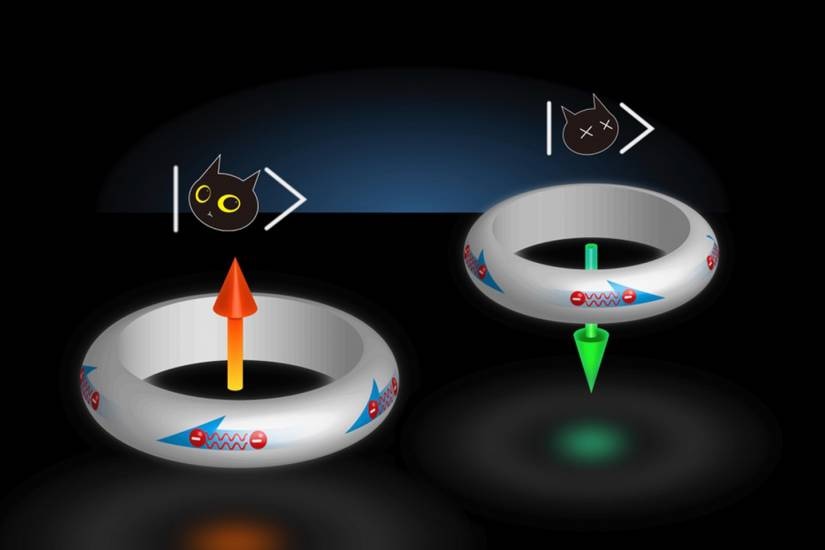Oct 11 2019
A discovery by researchers from the Johns Hopkins University could soon make quantum computers with the potential to carry out complex calculations, more secure data encryption, and more rapid prediction of the spread of viruses a reality.
 A visual representation of a qubit, which can exist simultaneously between two states. A famous example of a qubit is Schrodinger’s cat, a hypothetical cat that can be both dead and alive. Similarly, a flux qubit, or a ring made of a superconducting material, can have electric current flowing both clockwise and counterclockwise at the same time. (Image credit: Johns Hopkins University)
A visual representation of a qubit, which can exist simultaneously between two states. A famous example of a qubit is Schrodinger’s cat, a hypothetical cat that can be both dead and alive. Similarly, a flux qubit, or a ring made of a superconducting material, can have electric current flowing both clockwise and counterclockwise at the same time. (Image credit: Johns Hopkins University)
“We’ve found that a certain superconducting material contains special properties that could be the building blocks for technology of the future,” stated Yufan Li, a postdoctoral fellow in the Department of Physics & Astronomy at Johns Hopkins University. Li is the first author of the study, to be published in the Science journal.
In existing computers, bits, represented by an electrical voltage or current pulse, are used for information storage. Bits occur in two binary states, represented as “0” or “1” in computing. By contrast, in quantum computers, which are based on the laws of quantum mechanics, quantum bits, or qubits, are used. The qubits not just use two states, but also use a superposition of the two states.
Schrodinger’s cat is a famous example of a qubit. It is a paradox that proposes that a hypothetical cat may be both alive and dead at the same instance.
A more realistic, tangible implementation of qubit can be a ring made of superconducting material, known as flux qubit, where two states with clockwise- and counterclockwise-flowing electric currents may exist simultaneously.
Chia-Ling Chien, Study Author, Professor of Physics, Johns Hopkins University
The potential to use qubits makes quantum computers considerably more powerful compared to today’s computers while solving specific kinds of problems, for example, those related to drug development, financial modeling, artificial intelligence, cryptography, and weather forecasting.
However, to occur between two states, qubits based on conventional superconductors need a highly precise external magnetic field to be applied to each qubit, thus restricting their practical use.
In this study, Li and coworkers discovered that a ring of β-Bi2Pd occurs naturally between two states if an external magnetic field is not applied. Current can intrinsically circulate both clockwise and anticlockwise, at the same time, through the β-Bi2Pd ring.
A ring of β-Bi2Pd already exists in the ideal state and doesn’t require any additional modifications to work. This could be a game changer.
Yufan Li, Postdoctoral Fellow, Department of Physics & Astronomy, Johns Hopkins University
According to Li, the next step is to search for a particular type of particle known as Majorana fermions inside β-Bi2Pd. Majorana fermions are also anti-particles of themselves. They are fundamental to the development of the future level of disruption-resistant quantum computers, or topological quantum computers.
Majorana fermions rely on a unique kind of superconducting material—what is called a spin-triplet superconductor in which two electrons in each pair align their spins in a parallel manner—that has been elusive to researchers until now.
Li and coworkers performed a series of experiments and discovered that thin films of β-Bi2Pd have the unique properties required for Majorana fermions to occur. Furthermore, they believe that the finding of these unique properties will eventually lead to the discovery of Majorana fermions within the material.
Ultimately, the goal is to find and then manipulate Majorana fermions, which is key to achieving fault-tolerant quantum computing for truly unleashing the power of quantum mechanics.
Yufan Li, Postdoctoral Fellow, Department of Physics & Astronomy, Johns Hopkins University